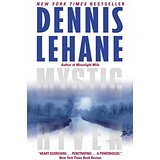During the first half of March, I furiously wrote and prescheduled posts for the A to Z challenge. I wanted to make it easier for me and give me time to enjoy the hop. At the end of March, I finished the book Mystic River by Dennis Lehane. And I had to go back and rewrite the J villain post.
This book laid bare a truth we tend to ignore–villains like heroes are on a journey. Its just that villains take different turns and make different choices. Villainy for most is an endpoint, rarely a starting point.
 Spoiler alert. If you want to read Mystic River (and I would highly, highly recommend it), I’m going to reveal a big, big thing. Simply, the story is a quiet, deeply emotional ride as we watch and feel Jimmy Marcus slowly descend and embrace his inner villain. Jimmy is a beautiful, beautiful character. As I write this, I continue to struggle to label him as a bad guy. He is. Definitely.
Spoiler alert. If you want to read Mystic River (and I would highly, highly recommend it), I’m going to reveal a big, big thing. Simply, the story is a quiet, deeply emotional ride as we watch and feel Jimmy Marcus slowly descend and embrace his inner villain. Jimmy is a beautiful, beautiful character. As I write this, I continue to struggle to label him as a bad guy. He is. Definitely.
I picked up the book thinking it was a mystery (the main thread focuses on the murder of Jimmy’s daughter, whom he loves to destruction). While some of the plot points I could guess along the way, the elegance of this book is how well it captures Jimmy’s internal changes, most of which I never saw coming. Jimmy is a flawed protagonist, and some of the tragedies in his life stem from those very flaws, as is standard fare in tragedies.
Lehane opens up Jimmy’s brain and heart to the audience. And we see how a villain is quietly made from the challenges that life throws out, and his natural human reaction to it. Together, it creates a downward spiral that seems to trap and numb humans into worse behavior, while justifying it as love and protection and defense and justice. The very things that make us good, also make us bad. In the following quote, Jimmy sees and accepts that final evolution.
He left the window and splashed warm water on his face, then covered his cheeks and throat with shaving cream, and it occurred to him as he began to shave that he was evil. No big thing, really, no earth shattering clang of bells erupting in his heart. Just that–an occurrence, a momentary realization that fell gently from grasping fingers through his chest. (p. 395)
Even so, his wife still loves him. His remaining children still love him. His neighborhood still loves him. And it is all this love that allows his choices, that justify his choices, which is the most complex finding of all.
If you’ve read the book, how did you feel about the ending? What does it tell us about karma? What does it tell us about bad guys?
Visit the other A to Z bloggers here.